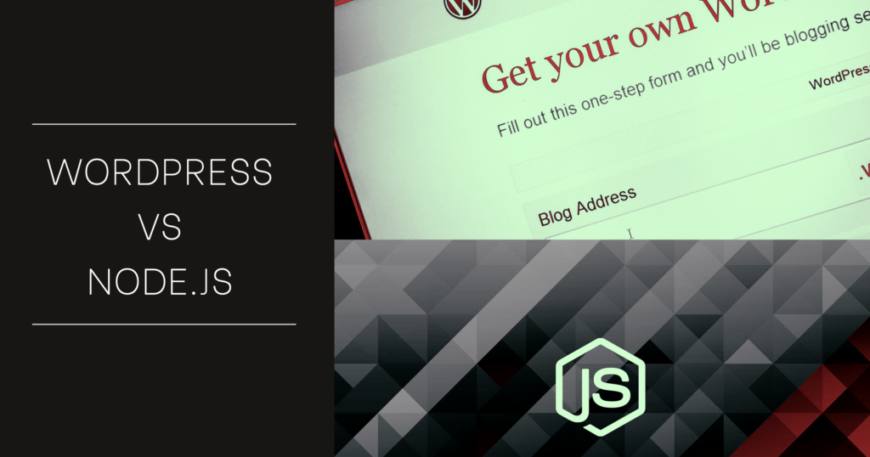You might have come across the word “WordPress” while searching for how to build a website. Everyone at some point interested in website development must have typed WordPress in their search engines. Not many of us have technical expertise to design an online presence so for starters, WordPress would be an acceptable option.
On the other hand, Node.js is a much newer alternative. This is a much common word used nowadays in conversations between Programmers or Web Developers.
1. Introduction
But what exactly is all this about? WordPress is a Content Management System (CMS), a very powerful tool for content creation & management. A lot of Blogs, eCommerce stores, business websites, etc. It is so widely used online that 60% of the CMS market is controlled by WordPress. WordPress powers both the back end of the website (the interface where a user logs in to make changes or add new content) and the front end (the visible part of the website that your visitors see on the web).
On the other hand, Node.js is an open source, back-end JavaScript runtime environment which allows the infrastructure to build and run an application. It’s a light, scalable, and cross-platform way to execute code. It uses an event-driven I/O model which makes it extremely efficient and makes scalable network application possible.
2. Beginner Friendly
WordPress is very beginner friendly. First of all, you don’t need a lot of knowledge of the back end side of web development to learn WordPress. Since it’s used by a lot of people around the world (& I already mentioned how much WordPress has dominated the CMS Market!) a countless number of tutorials, guides & resources can be found online. It is extremely accessible but because of this, it has very generic & bloated offerings. If you’re looking for a simple website with just average templates & themes, then WordPress is for you.
Node.js has a learning curve because experience in JavaScript is needed. Almost every programmer has a fair bit of idea about JavaScript. But once you’re well versed with its IDE then there’s an ocean of possibilities waiting in front of you. With some effort, you’ll find your way through the logic and syntax and successfully run the script.
3. Security
WordPress core software is a little secure. You can also enhance & add more security layers to your website by password protecting folders. You can also install WordPress Security Plugins to strengthen your Website’s security. But plugins won’t completely keep you safe from hackers. WordPress is a popular target for hackers & often have exploitable codes in the plugins. WordPress is a free software, available to everyone. The Back end login portal is easily accessible & this puts your website at grave risk of getting sabotaged. WordPress security continues to improve with a vigilant security team of core developers and users. Common WordPress security issues are usually due to user error, rather than the software itself.
Node.js on the other hand has an upper hand here. All of your back end files and source codes are stored in your server system. On top of that, security features can be implemented in your source code of your website & tweak them according to your needs. This makes Node.js even more secure than WordPress.
4. Content Creation
Setting up a WordPress website is as easy as it can be. You can get everything set up with just a few clicks. Dashboard menu has everything you need to write & publish your new posts. The Entire content creation experience on WordPress is very forthright. You can push new content to your WordPress site quickly and with ease. For starters, WordPress is the best option for you! No confusing & advanced settings.
Node.js is advisable on much larger projects & business websites with API’s (Application Programming Interface). It’s a little tedious work to set up Node.js. And for most of the simple, light blogging & personal websites, Node.js might be a bit overkill for the job. It would be like driving Formula 1 amidst rush hour traffic. But if you want to make an impressive, unique site with amazing User Interface/Experience (UI/UX), then go for Node.js.
5. SCALABILITY
Let’s suppose you have a very heavy website. That takes space of GB’s. The thing with WordPress is that the baseline options are not quite scalable. You need to pay a good monthly subscription for WordPress to handle those heavy plugins for your site. Or else your WordPress website will suffer long loading time because of the size of the website or also because of heavy traffic. If you are on a tight budget, WordPress will not be a very value for money option.
Scalability offered by Node.js has benefited many Large-scale organizations. The V8 engine that it runs on makes Node.js untouchable in terms of computing speed. The JS code is converted to a native language and the resulting operating speed has awed many enterprises.
This is a result of single-threading. Node.js uses single-threading to process requests rather than the traditional multi-threading. This saves a ton of computing speed and space. While the request is on hold for certain requirements to fulfill, other requests can be processed simultaneously. This boosts the overall computing capacity of the server.




